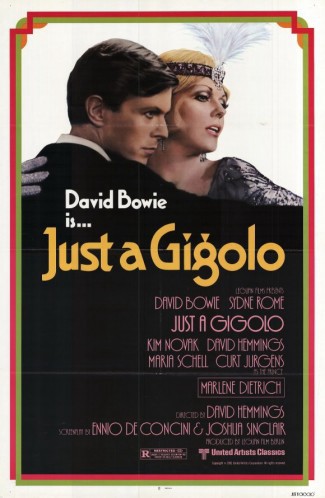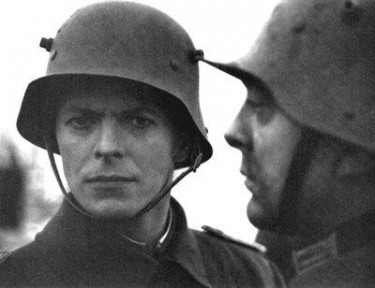New York City, January 24, 2013

★★★ Not quite as shatteringly cold as the day before; even so, by now things other than water were frozen on the pavement. Coffee? Outside the bodega, bare painted plywood shelves stood where the flower display would have been. In the next block, on cafe tables, blossoms dangled slain from the rims of their flowerpots like the pompom fringe on a hat. Bursts of steam blew overhead across the street, against the featureless blue, dissipating almost entirely before they could reach the roofline opposite.
"The Thetan Templar," by Dan Brown: Last Plane To Benghazi

Don’t miss the startling first chapter of The Thetan Templar.
Chapter Two
It was cold and drizzly outside — as cold as the trail leading to the Islamic glass dildo, currently nestled within the elegant antique Egyptian laptop desk in the office of NYU Professor Nate “Shirky” Stryker, the world’s leading academic in the fields of new media, the occult and nanotechnology. But Stryker wasn’t keeping office hours today, and neither was the mysterious dildo.
“Get the phallus,” Nate Stryker said to his beautiful assistant professor, Tanalyne Foster Wallace.
“What’s a phallus?”
Stryker glanced out the window with its unobstructed view of the Empire State Building
“You’re a genius,” she said, brushing a lock of lush, brunette hair from her eyes. “I don’t think I’ve ever heard that word before.”
“It’s Greek,” Stryker said with a knowing smile. “But there’s nothing Greek about the Arabic tattoos around the ankles of these severed legs in my elevator.”
Tanalyne returned with the antique glass dildo and placed it gingerly in Stryker’s waiting hands. He squinted at the elaborate Arabic calligraphy and then lifted one of the legs to his eyes. A perfect match.
“We’ll need to get the Mayor’s Office of Terrorism involved,” Stryker said with a grimace. The last thing he wanted was to see this story blown out of proportion by the right-wing political blogs.
“I’ll text Sully directly,” she replied, obviously referring to Tankard O’Sullivan, the gruff police commissioner in charge of the city’s terror squad.
What a disaster, what a world, Stryker thought. I should be halfway to Cairo by now, enjoying a flute of my favorite champagne and finishing up this animated GIF edition of the Nag Hammadi codices. But instead I’m still stuck in my office with more legs than Radio City Music Hall.
The detectives arrived in minutes, making use of Stryker’s heliport atop New York University’s Forensic-Parapsychology Studies building.
“Hullo, Tanalyne,” Sully said to the associate professor. “You’re looking a lot better than this old idiot you work for, as usual.”
“Touché,” answered Stryker. It meant something like the American word “touch,” but Sully was a tough first-generation Irish cop, so he didn’t know.
“Blimey, look at the leg stumps,” Sully cursed. “No blood!”
Stryker wiped his brow with his trademark tweed beret and studied each of the dismembered legs.
“Of course there’s no blood,” he said finally. “These aren’t human.”
“You don’t mean?” Tanalyne bit her lower lip gently, haltingly.
“No for God’s sake, not aliens. These legs are from mannequins.”
And that means the Fashion District, Stryker deduced. Or, at least, from an exclusive uptown retailer. These legs are of the highest quality, not the kind of dingy gams you see poking out of some knockoff at Century 21.
“Turn on the television,” Tanalyne said, looking up from her porcelain Google Android clamshell phone. “The president is about to speak.”
“About to speak about what?” barked Sully, who didn’t care for politics.
“About the other dozen legs just like these, found moments ago in the ruins of a just-discovered Benghazi sun temple dating back to third millennium, B.C.”
Nate Stryker hit the UP button and they all went to the rooftop helicopter port, including the mannequin legs. But the helicopter had taken off without them.
And it was on fire.
"Dolphin Not Echolocating"
If you do care about the poor dolphin in the Gowanus, our man Dave Bry has been out there for hours.
Three No-Booze Cocktail Recipes From A Bartender Wizard
Three No-Booze Cocktail Recipes From A Bartender Wizard
by Awl Staff

As we round the corner into the final week of Drynuary, here are three nonalcoholic drink recipes from Sean McClure, who runs a consulting company called Cocktail Chemistry. While behind the bar at Craft, where McClure worked until last summer, he spruced up the beverage menu to include some terrific nonalcoholic options. As he put it to The New York Times, “All the time, people come in who are pregnant or who don’t drink, and if their dining partner is doing something like a full tasting menu with wine pairings, I don’t want them to have to suck down Coke all night.” The Times singled out the Yuzu Rose Spritz as particularly great, and that remains McClure’s favorite one, too (he describes it as “refreshing, bright, interesting”). The recipe for it is included here, along with two other ones to try — and perhaps surprise a nondrinking friend with next time you’re hosting. As with the best people, the first two are a little tarty, with some effervescence underneath.
CRIMSON GLORY

• 2 oz. fresh blood orange juice
• ¾ oz. fresh lemon juice
• ¾ oz. basil simple syrup (recipe follows)
• 3–5 lg. basil leaves
• 2–3 oz. fever tree bitter lemon soda (club soda works, too)
• 1 blood orange slice and basil sprig
For The Basil Syrup
Wash 1 ½ cups (packed) fresh basil, place it in a blender and set it aside. Bring ½ cup of water to a boil and add 1 cup of granulated sugar. Stir until dissolved. Bring it back to a boil and pour it into the blender containing the basil. Blend for 10 seconds. Let it steep for 15–20 minutes and strain through a fine mesh strainer. (Note: You won’t need to for this drink, because of the blood orange, but for a brighter green syrup, steep the basil in cold syrup for 72 hours.)
To Mix
Combine the juices, syrup, and basil leaves in a Boston shaker with cracked ice and shake vigorously for 30 seconds. Double strain through a fine mesh strainer over fresh ice into the glass, top with the soda and garnish with the orange slice and clapped basil sprig. (Clapping the basil or bruising the basil releases the fresh aromas.) Serve in a Riesling or a small wine glass.
PASSION AND HEAT

• 2 oz. unsweetened passion fruit juice (Boiron brand)*
• 2 tbsp. fresh chopped ginger
• ¾ oz. fresh lime juice
• ¾ oz. jalapeño syrup (recipe follows)
• 2–3 oz. Fenteman’s ginger beer (or another nice spicy ginger beer — spicy, not sweet is important)
• 1pc. lime wheel
• 1pc. candied ginger
• 1pc. brandied cherry
For The Jalapeño Syrup
Cut the stems off two large jalapeños and place them in a blender and set it aside. Bring ½ cup of water to a boil and add 1 cup of granulated sugar. Stir until dissolved. Bring it back to a boil and pour it into the blender containing the jalapeños. Blend for 10 seconds. Let it steep for 10–15 minutes and strain through a fine mesh strainer. (For spicier, let it steep longer.)
To Mix
In a small mixing tin combine and muddle the fresh ginger and lime juice. Add ice and all other liquid ingredients except the ginger beer. Shake vigorously for 20 seconds and double strain over fresh ice into the glass. Top with the ginger beer, stir lightly and garnish with the lime wheel, candied ginger and cherry. Serve in a Collins glass.
YUZU ROSE SPRITZ
• 1 ¼ oz. Fresh Shibori Yuzu juice (you can order it from Fresh & Wild)
• ¾ oz. Fresh lemon juice
• ½ oz. Mymoune rose syrup (this can be ordered from Kalustyan’s
• ½ oz. Simple syrup
• Club soda
• Rose Petal (organic)
To Mix
Combine all liquid ingredients except the club soda in a Boston shaker. Shake vigorously. Strain over three 1″ cubes in a highball glass. Top with club soda and garnish with the rose petal.
* Note for Passion and Heat recipe: It’s important to use unsweetened passion fruit juice due to the fact that most sweetened juice is artificially flavored and sweetened with high fructose corn syrup. When using fresh juice make sure to strain the pulp out of your juice before measuring.
You can email Sean about Cocktail Chemistry here.
Previously in Buzz Off: Grenadian Sorrel Drink
Here Is Another Way Life Is Harder For Republicans In America Today
“Conservatives and Republicans feel a bit under siege these days because their views are not officially in style.”
Readers of Lance Armstrong Books Sue To Get Their Money Back

If you’re the kind of lifelong dupe who bought a book by Lance Armstrong, there’s really no helping you. But, still, the wheels of justice must turn, etc., and both law firms and the U.S. Postal Service depend upon those bulk-mailed class-action suit notices. So a couple of consumers in California have gone to federal court in hopes of making a big deal over the long-known truth about Lance Armstrong, the professional drug dealer and sports cheat.
Rob Stutzman and several others who bought Armstrong’s “It’s Not About The Bike” and “Every Second Counts” have filed a lawsuit in Sacramento federal court. It alleges Armstrong duped them into believing the books were inspirational true accounts of the cyclist’s accomplishments done without performance-enhancing drugs. The lawsuit accuses Armstrong and the books’ publishers of committing fraud, false advertising and other wrongdoing for publishing the cyclist’s vehement denials that he wasn’t a cheat.
These readers next plan to launch class-action suits against Diary of a Wimpy Kid, Richard Nixon and the unnamed authors of the Old and New Testament.
Photo by Loren Javier.
Get Ready For America's Chronic Traumatic Encephalopathy Championship!
Here’s some background material to get you pumped up for next week’s Big Game.
David Bowie's Forgotten, Campy Berlin Gigolo Movie
by Anthony Paletta

To attempt any ranking of David Bowie’s work in movies on a scale of strangeness seems a fool’s errand; there’s no computer on earth that can tally up respective curiosity points for playing both Nikola Tesla and Pontius Pilate, Andy Warhol and The Snowman, The Man Who Fell To Earth, and The Man Who Would Be Goblin King. That said, it’s difficult to find a Bowie performance more abjectly forgotten — and yet so wonderfully bizarre — than the Weimar-set 1978 black comedy Just a Gigolo. Perhaps, you ponder, it was just a cameo? Nope, he’s the star and the rest of the cast is filled out by — get this — Kim Novak, David Hemmings, Curt Jurgens, and Marlene Dietrich (in her last film role). It’s also alleged to have been the most expensive film made in Germany until that date. Still not ringing any bells? You’re not alone.
There are reasons why this film is obscure. It is, in the most charitable possible evaluation, a mess: Bowie has described it as “my 32 Elvis films rolled into one.” And yet life on that ever-dwindling island of not-on-region-one DVD films is a harsh fate for any film and particularly for this one, which is at least as interesting as its cast suggests and a good deal more. You don’t need to dig out the VHS player to watch Mick Jagger run an agency of gigolos in The Man From Elysian Fields — you shouldn’t have to do so to watch Bowie play one.
The late 70s and early 80s were a banner period for goofy-but-fascinating Weimar-era English-language international productions, movies like Bergman’s The Serpent’s Egg, Fassbinder’s Despair and Lili Marleen. Given a context in which sending Dirk Bogarde or Keith Carradine to West Germany seemed like a not-uncommon foundation for a production it’s little surprise that David Hemmings (who both acted and directed, now somewhat portlier than when he appeared in Blow-Up, and looking for all the world like a moonlighting Paul McCartney) was able to enlist considerable funding for this “highly-ironic, tongue-in-cheek” directorial project, including, it was rumored, $250,000 to induce the 77-year-old Marlene Dietrich out of retirement for two days’ work. Bowie was evidently interested in meeting Dietrich; as it happened, she was filmed in Paris, while all of his scenes were filmed in Berlin; their scenes were then edited together. Few things are ever quite fair.
And Bowie? Well, the basic details of his Berlin sojourn are no doubt familiar; trying to kick a mounting cocaine addiction and drawn by the stranded glories of West Berlin and energy of German music he moved to that city in 1976 and spent three years there: life in cheap Schöneberg, check; Iggy Pop as roommate, check; Low, a hit; Heroes, recently finished, also a hit. He agreed to star in Just a Gigolo as a favor to Hemmings (as well as an excuse to meet Dietrich), and no doubt lived a schizophrenic life during the duration of the shoot; how often have you donned Prussian military garb during the week and helped Brian Eno mix Devo’s Are We Not Men? We Are Devo on the weekend? (Another rumor surrounding the production is that Eno appeared as an extra; if he did, I couldn’t find him.)
The film’s international pedigrees begin at the title. A 1928 Austrian song “Schöner Gigolo, armer Gigolo” had already been redrafted into English in the early 30s as “Just a Gigolo” en route to recordings by Bing Crosby, Louis Prima, Louis Armstrong, and Irène Bordoni (hers for a 1931 movie of the same name). Naturally, Pynchon couldn’t resist the tune; Franz Pökler sings a riff, “A Victim in a Vacuum” in Gravity’s Rainbow. (You may remember David Lee Roth recorded a version far later, but that’s a story for another day.)

In any case, this title, in either language, plays out against the arrival of proud Prussian Paul Ambrosius Von Przygodski (Bowie; given the inflated length of the character’s name, we’ll dispense with it, like the Reichsmark, for the rest of the piece) at the Western front, where he reports to Captain Hermann Kraft (Hemmings). Bowie is (naturally) nonplussed by the carnage around him. He stands unflappable on the edge of the trench as Kraft asks:
“Would you like to come down here?”
“Is it absolutely necessary?”
“It is customary.”
Bowie consents to come down.
By a singular stroke of ill fortune, Paul reported to the front approximately two minutes and forty-five seconds before the end of the war, yet also about two minutes and fifty seconds before being knocked out in a shell blast. He awakes to find a sheet up to his nose, his head swathed in bandages, and a brass band playing “La Marseillaise.” Yes, there’s been a mix-up; David Bowie might be a chameleon but he’s never been French. The band departs in high bumptious indignation from the hotel room. From this point, Bowie’s character must struggle to get back to Berlin, which takes him quite a while as two years have passed during the title sequence, during which we see an assortment of footage that looks like it might have been too free-spirited for “Berlin: Symphony of a Great City” including a merry file of riders on extra-tall unicycles in front of the Brandenberg Gate.
This tale, of the delayed return from war, is nothing new. Don’t confuse this with that other film about combatants getting back late from the Great War whose title is borrowed from a song; that’s Laurel and Hardy’s Pack Up Your Troubles. Tonally, the similarities don’t end there though; when David Hemmings described the film as “tongue in cheek” he was clearly engaged in a bit of puckish Hemmings-like understatement; some of the film is wryly comic, some is blacky portentous, and some is straight-up slapstick. Bowie’s return to Berlin, cradling a pig, sees him immediately chased by a ravenous crowd (cue Germanic chase music).
Crowd: “He’s got a pig!”
Bowie: “Get your own pig!”
Before the crowd was overtaken with bacon dreams, we also had a glimpse of Bowie’s one co-written contribution to the soundtrack, the Weill-and-Brecht-like “Revolutionary Song” which we see sung by his sweetheart Cilly. The song is, not to put too fine a point on it, bad, but take a look for completism’s sake. It’s been speculated that Bowie’s only lyrical contribution was the series of “la-la’s.” The song was released as a single in Japan, somehow.
Back home though. The war years have clearly been rough, and Bowie returns to find his home turned into a pension and once-familiar rooms occupied by an assortment of Grosz-like lodger-grotesques. His aunt Hilda is disappointed with his return: “Oh my boy, if your father hears that all you’ve brought back from the war is a pig he’ll have another stroke of paralysis.” Bowie’s martinet father, clad only in military costume, hasn’t, of course, spoken a word since the surrender. His mother, good heavens! now works at the local Turkish bath.
His economic prospects are not auspicious. We’ve heard this story before also, from Alfred Döblin, and, of course, Bowie idol Christopher Isherwood. As Isherwood wrote in The Last of Mr. Norris, in 1935:
And morning after morning, all over the immense, damp, dreary town and the packing-case colonies of huts in the suburb allotments, young men were waking up to another workless empty day to be spent as they could best contrive; selling bootlaces, begging, playing draughts in the hall of the Labour exchange, hanging about urinals, opening the doors of cars, helping with crates in the markets, gossiping, stealing, overhearing racing tips, sharing stumps of cigarette ends picked up in the gutter, singing folk-songs for groschen in courtyards and between stations in the carriages of the Underground Railway.
As a credit to his imagination and that of the screenwriters, Bowie doesn’t do any of those things, but he does spend a stint carrying towels in a bathhouse and then serving as a walking bottle-advertisement. Think the Eat-At-Joes Man, only instead of sandwiched between planks encased in a huge bottle. Cue also the scene of attempting to enter the urinal in this get-up — here’s one of the slapstick interludes I mentioned. The prostitute lodger upstairs comments, “I think shame belongs to another decade. You shouldn’t be ashamed of your bottle either; it’s a wonderful hiding place until you’ve found yourself.”
Prussian Bowie has definitively not found himself. Prussian Bowie is drifting and lost. Prussian Bowie finds no solace in offered sex. Turning down the overtures of Cilly, he says, “You’re behaving like an actress, like some sexed-out, irresponsible immoral slut.” Captain Kraft (Hemmings) who Bowie hasn’t seen since the war, offers a glimpse of hope; he indicates that he will “show you such things as will change the philosophy of your life.” What Hemmings shows Prussian Bowie is an abandoned U-Bahn car in a tunnel, a scratchy Victrola, nascent Nazism, and an angry paramour named Otto. Otto: “Because of your rosy cheeks I know you think you’re pretty enough. Do you think you can jump into our bed?” No, this isn’t at all what Bowie was thinking.
Bowie comments to Cilly, “It’s just that I think I’m coming very close to my lifelong purpose.” “What purpose?” asks Cilly? “Bowie replies, “Well, I’m not sure yet, but people are taking notice.”

It may seem superfluous, having reached this point, to note that the film’s dialogue leaves a bit to be desired; its script was written in English originally but is a remarkable simalcurum of a cut-rate translation, with lines brimming with superfluous exposition, unnatural phraseology, or both. “To what do we owe this unexpected visit of our housekeeper’s socialist daughter?” is a perfect line for that segment of the audience who might have thought that singing lyrics like “When all we want is everybody free/The universe would be one brotherhood” in the street was merely a common day job for the indigent in Berlin, and offered no reflection of political beliefs. To hear Bowie offer lines like “I don’t think we should play around until the Kaiser returns” is a pleasure of its own though.
Moving on, Cilly receives a contract in Hollywood and skips town. Bowie finds himself at the burial of a deceased officer, which is interrupted by a gun-battle in the cemetery. He and the deceased widow (Kim Novak!?! 20 years post Vertigo, and looking sultry) seek shelter in what seems to be a mausoleum and, overcome by the tension, immediately screw on the floor. She orders, “Charge, Lieutenant, Charge! Mount! Attack! Victory!”
Bowie quickly becomes bored of being her plaything; it’s convenient that he’s had another offer. He meets Marlene Dietrich in her establishment, “The Eden,” suspiciously full of slim and dapper young fellows, where she offers him Dom Perignon and a new meaningful purpose. “Dancing, music, champagne; the best way to forget, until you find something you want to remember,” Dietrich mournfully but purposefully intones, and then on to practicalities. Dietrich: “I’m the head of a regiment of sorts… of gigolos.” Bowie, roundly bored, assents.
Those of you who expected some increase in sex in this point are of course bound to be disappointed, because 1. the movie by now is almost over and I don’t mean to give away much more 2. you should have known better, given that the genre of “gigolo” films is almost without exception an exploration principally of male alienation, not of well, coupling. Ask Richard Gere. Gigolo-in-Weimar-Berlin might seem a terribly heavy-handed theme for a film, and in ways it is; yet there’s something of merit in the dramatic conceit of voluntarily turning to self-sale in a society in which any almost any option smacked of meretriciousness. Here it seems like a frequently interesting angle on interwar Germany that’s struggling to get out of a clumsy script and a very unfortunate edit.
We can regret the bizarre editing of the film, which saw a 147-minute cut pruned by nearly 50 minutes for US and UK release. I haven’t seen all of the German cut; it unquestionably offers advances of continuity over the English-language versions, yet it too seems short of complete scrutability. If you want to have an extremely disorienting but vibrant adventure in non-linear viewing spend some time surveying the non-contiguous clips of the film in both languages on Youtube (here’s part 1 of the German and English cuts).
For all of the film’s countless flaws though, it’s simply too interesting, inadvertently, intentionally, or historically, not to watch, whether for the sake of Novak and Bowie’s cemetery romp, or Curt Jurgens having a chat with Bowie about screwing his fiancee while Bowie’s in the bath, or for Sydne Roman’s vibrant appearances (lovely star of Roman Polanski’s also-forgotten What?), or Bowie’s father’s metaphoric Junker enraged paralysis made literal, or a lavish dance sequence in a film-within-a-film, or for Marlene Dietrich’s beautiful performance of “Just a Gigolo” near the end of the movie (watch it in the clip above). Also, it’s far from Bowie’s finest acting performance but his natural demeanor, alien yet regal, does suit the part well. He had recently launched the “Thin White Duke” persona; here he’s a natural aristocrat. Oh, and I failed to mention the Greek chorus interludes of two elderly women opining on the passing political situation; think the German Statler and Waldorf in elaborate hats.
Bowie commented, during his sojourn there, that Berlin was a city “cut off from its world, art and culture, dying with no hope of retribution.” And yet he’s back there again in his latest single, “Where Are We Now?, starting off, “Had to get the train/from Potsdamer Platz/You never knew that/that I could do that.” You never knew that Bowie had uttered such lines as “I may be a gigolo, Fraulein Keisling, but I’m not a whore” either, and now’s your chance to catch up.
Anthony Paletta is a writer living in Brooklyn. He has written for The Wall Street Journal, Metropolis, The Daily Beast, Bookforum, and The Millions on urban policy, historic preservation, cinema, literature, and board wargaming. Previously for The Awl, he’s written about Soviet architecture and preservation of Brutalism.
It May Not Be Evil But Quinoa Does Pretty Much Suck
“Can vegans stomach the unpalatable truth about quinoa?”
— Oddly, this query has nothing to do with the flavor of quinoa, which, let’s be honest, is the type of thing that you try at first because it’s kind of trendy and a lot of people you like and respect are going, “Trust me, this is good,” and then you eat it and you’re all, “Hmm, that’s… unusual,” and for a while you think everyone is actually on to something but then a few months later you suddenly realize that, wait a second, the only thing that is appealing about this is that it’s supposed to be better than it actually is and the only reason we’re all eating it is some kind of mass delusion and also we don’t want to admit the embarrassment of being suckered in to something that is considerably less palatable than promised in the first place plus it tastes like wheat and chalk. It is the Sheila Heti of grains, basically.
Kendrick Lamar on Funkmaster Flex's Show
In town to perform on “Saturday Night Live” this weekend (where he hopes to be written into a comedy sketch), Los Angeles rapper Kendrick Lamar visited Funkmaster Flex’s Hot 97 show yesterday. Watch how he twitches his right hand when he raps. It seems like a device he’s developed to help him remember his lyrics. Like some kind of muscle memory thing or something. It’s cool. And he’s really, really, really good.
